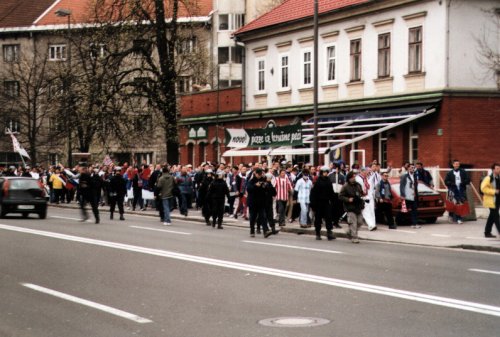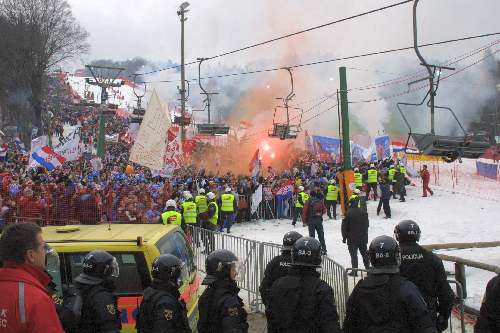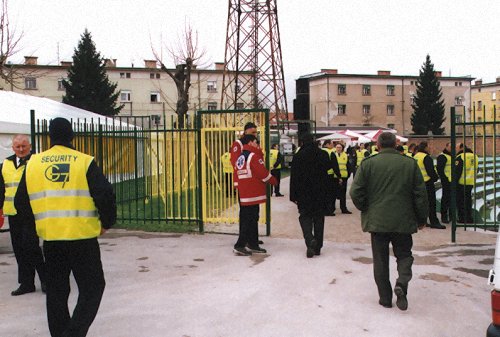The organizers of various sporting events, the visitors of these events and, of course, we, the police officers who are involved in ensuring security and public order, wish to prevent riots to take place.
If such events do occur, with use of the following advice and recommendations we want to minimize the consequences.
 Behavior before a sporting event
Behavior before a sporting event
Go to the sporting event on time and do not arrive under the influence of alcohol!
We also recommend that:
- monitor regular media reports on the organiser's measures to maintain law and order and traffic safety in connection with the event;
- get your ticket for the sporting event in time, as you will not be allowed to enter the sports facility (stadium, hall, hippodrome, etc. ) without it;
- you avoid buying tickets on the so-called black market and their resale;
- arrive to the sporting event on time, as the entrances are often crowded right before the event begins;
- do not come to a sporting event under the influence of alcohol or bring alcoholic beverages to the venue;
- do not bring weapons, dangerous objects, pyrotechnics and other means to the sporting event that could endanger the safety of athletes and spectators;
- note that in order to ensure security, you may be subject to searches and photo or video surveillance upon entering the stadium;
- use public transport if possible to get to the sporting event.
Note also that police officers can prevent violent groups from accessing a sporting event, and can temporarily (for one year) ban fans who have been fined for misconduct at matches from attending a sporting event.
 Behavior during a sporting event
Behavior during a sporting event
Cheer sportingly, culturally and correctly! We advise you to:
- after entering, sit down in the seat or part of the stand intended for you;
- do not move from one stand to another without the permission and cooperation of the stewards;
- follow the written and verbal instructions of the stewards and the announcements of the official announcer;
- do not throw any objects onto the court during the match;
- do not climb on guardrails, safety barriers or walls;
- cheer in a sporting, cultural and correct manner and do not allow any insults or racist, xenophobic and homophobic behavior;
- do not fall for possible provocations and refrain from violent acts;
- keep an eye on your property, as the crowds that can arise at a sporting event create ideal opportunities for theft;
- if you see or hear someone in trouble, don't ignore them (next time you might need help yourself). In such cases, inform the stewards or the police as soon as possible about the person who needs help;
- inform the stewards (who ensure order in the event area) or the police also about illegal behaviour by heated sports fans, which indicates criminal offences or misdemeanours.
 Behavior after a sporting event
Behavior after a sporting event
Before leaving the venue of the event, we recommend that you:
- check your belongings before leaving so that you don't forget anything at the venue;
- leave the venue in a tolerant and calm manner;
- avoid contact with challenging fans of the opposing team.
Behavior in the event of police intervention
Please note that order and safety at sporting events is the primary responsibility of the organiser. Police officers intervene only when public order and peace are threatened at the sporting event and the organizer is no longer able to guarantee security. Police action is therefore necessary when, despite all preventive measures, individuals or groups manage to provoke disorder. In such cases, to be as safe as possible, consider the following:
- police officers have a legal duty to prevent and detect crimes and misdemeanors and to detect and arrest their perpetrators;
- police officers must restore public order when it is violated, and may use legally prescribed coercive means;
- in the event of police intervention, you are obliged to obey their orders and requests;
- disobeying the orders of the police officers may have signs of a misdemeanor or in certain cases even a criminal offense for which you will be held accountable;
- if you are not directly involved in the violation of public order, try to retreat or move as far as possible from the scene of the disturbance so as not to hinder the intervention of the police.
 |
 |
 |
 |
 |
Related content
Securing public rallies and events
Maintaining public peace and order
Peronal safety

